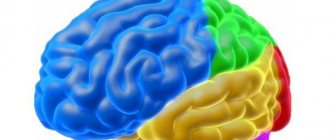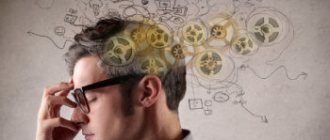March 19, 2012
Scientists are still arguing about how the human brain works. However, they already know something well.
The brain is the most complex system of the human body, which controls all its activities. With the help of this system, not only conscious processes are controlled: speech, movement, emotions. The brain also regulates all processes that occur automatically in the body: movement, blood circulation, maintaining balance and many others. Scientists are still arguing about how the human brain works. However, they already know something well.
How to kill your brain?
Alcohol and nicotine are neurotoxic poisons. Find out how quickly they can kill a person's brain.
Unique properties of the human brain
Intensive brain formation occurs at a young age, from 2 to 11 years. To fully utilize the capabilities of the human brain, new, strong neural connections are required. There are no strong connections in the children's brain yet. Their formation occurs during learning, cognition and acquaintance with the world. A typical method of memorization for this age is the use of eidetic memory, thanks to which children more easily learn a lot of new material. In adults this ability is extremely rare.
The unique characteristics of the human brain are supported by facts:
1. The organ works without breaks, without days off, even during sleep its high activity is observed.
2. The organ does not get tired from work - research has proven it. The blood of an intellectually busy person remains unchanged at the end of the working day.
3. The brain reacts the same to thoughts, whether they are inspired by fantasy or imagination.
4. The brain can store some situations for a long time and others for a short time.
5. Most of the processes are controlled by the subconscious. The subconscious is activated in order to avoid overload, bypassing consciousness.
6. The speed of thought outstrips the speed of light, which muscles cannot keep up with. Bad handwriting is proof of this.
7. The brain wakes up a little later than the body. A person who has just woken up needs exercise (physical) and for the mind.
8. Thanks to mental exercises, the volume of neurons increases and their connections improve. These exercises slow down aging and prevent Alzheimer's disease.
9. Thoughts that often appear turn into reality. Therefore, if you want to change something, you should change your own thinking.
10. Compensation is the ability of an organ to use, for example, the part that is injured.
11. Relieve brain tension through prayer or meditation.
Scientists have discovered the brain's ability to change physically. Such manipulations take place over a long period of time. Transformation depends on attitudes, on what a person thinks.
The human brain has incredible potential that has not yet been explored. For a long time it was believed that neurons do not renew themselves, but only die. The opinion changed after the discovery made by Elizabeth Good. She found that neurons can grow and also renew themselves at any time in life.
Conclusion. Training your mind can unlock a new secret of opportunity.
Should we develop mental abilities?
Is it possible for any person to unleash the abilities of the mind, for example, to solve complex problems? You can learn a lot if you apply effort and consistency in training.
Study even after graduating from school or college? I unlearned it and that’s it. But no. The brain requires constant work, otherwise it degrades. By the way, only 0.3% of the total population are some kind of genius people. The vast majority of humanity is engaged in routine and they are happy with their situation. The main thing is that a person should feel comfortable.
Sentinel in my head
- Intuition, inner voice, sixth sense - what is it?
— I think it’s the experience accumulated over a lifetime and a subconscious analysis of the situation. For example, a person sees signs of danger, but does not have time to fully understand what he sees. However, based on these signs, the brain gives a command with lightning speed, which we consider to be a hint from the inner voice. We can instinctively stop in the middle of the street or, on the contrary, sharply speed up our pace, noticing out of the corner of our eye an icicle or brick falling from the roof.
The human brain has a mechanism for comparing a real situation with a control one - that is, a certain matrix of stereotypes. Figuratively speaking, there is a sentry on duty in our head all the time, who collects the overall picture, processes it, consolidates it, and then monitors the current situation, checking whether anything has changed. If changes occur, a signal appears in the brain - vague anxiety, a feeling that something is wrong. Note: the brain does not say what exactly is wrong, but simply “spoils your mood.” The task of the “sentinel” is to monitor deviations from the standard and pay attention to them, and then let the person decide for himself what to do.
Question answer
What is the left hemisphere of the brain responsible for?
- But then why does such vague anxiety often appear long before the event? What is this - foresight?
- I’ll answer with a saying: “If Mr. Hussar goes to play cards all night, then during the day, when nothing has happened yet, his wife is already starting to worry whether he will lose to smithereens.” In other words, you roughly understand what bad things can happen, and you begin to worry in advance, assessing the chances of success. Foresight is an analysis of a situation.
— How great is the influence of human will, in your opinion? Where is the line beyond which she is no longer powerless? Or is a person capable of anything until he dies?
- Of course not, I’m not capable. This trait is a departure from the normal situation: a serious illness, serious injury, drug poisoning... The brain works well in conditions of stability. When emerging instabilities are kept within limits, he smoothes them out perfectly. But there are situations when nothing will help: there will be willpower, there will be no willpower - that’s all. For example, there are influences against which the brain is powerless: if certain substances are introduced into the body, for example psychotropic or narcotic substances, then resistance is almost impossible. There are legends about strong-willed intelligence officers who remained silent under any torture. But after treatment with special psychotropic drugs, a person loses his will and answers any question.
Question answer
What is the right hemisphere of the brain responsible for?
— You, among other things, explore the phenomenon of creativity in man - the “divine spark,” as they say.
If it's not a secret, on what devices is this done? — There are quite a lot of them: positron emission tomograph, magnetic resonance imaging, various devices using modern electroencephalography methods. We invite people to perform certain creative tasks - for example, come up with a non-standard phrase. And we see on the devices how the brain functions in this situation.
Creativity is perhaps the only activity that activates the entire brain. For example, when you are just having a conversation, the area of the brain near your temple is activated, and when you listen to a speech, the area is slightly behind. This does not happen with creativity, because the person does not know what resources will be needed to solve the problem. Oddly enough, the same neurons are involved in the process of thinking, in performing certain actions, and in controlling the functions of internal organs.
The last scientific monograph of my mother, Natalya Petrovna Bekhtereva, was written on the topic “Smart people live longer.” The famous gerontologist Vladimir Anisimov speaks about the same thing: scientists in those specialties where creativity is mandatory can often boast of their longevity.
Revealing the secrets of the brain. Natalya Bekhtereva knew the secret of longevity Read more
What is IQ
IQ is the intelligence quotient adopted in 1912. It is determined by solving test problems, each of which should be different in complexity.
1. IQ 70 is the lowest.
2. The IQ of an ordinary person is 100.
3. An IQ score above 100 determines a person’s increased abilities.
For example, the average Japanese IQ is 111. Only 10% of Japanese have an IQ of 130.
Is it possible to increase your IQ level? American doctor Andrea Kuszewski, at the beginning of her career, worked with a mentally retarded child. She developed a program that ran classes for three years. As a result, the child’s IQ after completing the course was 100.
After the experiments, the following conclusion was drawn:
• mental abilities can be trained;
• you can start training at any age;
• anyone can improve their abilities.
Where to begin?
A person uses approximately 5% of the brain's capacity, or 10% at best.
This body has protection that allows you to use the opportunities for as long as is currently required.
There are several rules for those who want to increase their IQ level:
1. Steadily “feed” your mind with healthy food. You can solve mathematical or logical problems, master a musical instrument or study foreign languages, explore countries while traveling.
2. The best way to train (for some) is computer games.
3. Extraordinary abilities are developed by solving one problem using several options.
4. Complex solutions to any problem should be chosen.
It has been proven that you need to develop mental abilities under stable loads. You can start by solving simple problems. In other words, go from simple to complex:
• solve crosswords;
• read books, newspapers;
• learn poetry;
• solve mathematical problems;
• remember information read;
• study languages;
• master a computer that helps you control your own emotions.
It doesn't take much time to complete these loads. Just half an hour a day is worth spending on exercise to maintain adequate brain activity until old age. It is necessary to improve the abilities of the human brain at any age.
As a result, after such classes a person receives:
• blood circulation will improve, that is, brain nutrition;
• the result of training promotes unlimited perception of information;
• the risk of developing age-related diseases or diseases like depression will significantly decrease.
Interesting! A sign of concern should be deterioration in memory. In such a situation, computer games can be recommended. It has been noticed that people who play computer games remember information better, and they also have a high reaction speed. It is the speed of reaction to an unusual situation that can reflect the state of brain activity.
Thinking Jelly
Vladimir Kozhemyakin, AiF: - Svyatoslav Vsevolodovich, what in the activity of the brain seems to you the most mysterious and inexplicable?
Svyatoslav Medvedev: What I have essentially devoted my scientific life to: the still unresolved question of how brain neurons are organized into a system. Imagine: a computer and a brain. The number of elements in the brain is 100 billion neurons. To describe the interaction between them, we need a volume of computer memory comparable to the number of particles in the Universe we see. At the same time, the speed of information propagation throughout the brain is only 1400 m per second. In a computer, this is actually the speed of light. And, by the way, the brain operates on energy comparable in power to that provided by a car battery. Let me note that in powerful computers tens of kilowatts are spent just on cooling. But at the same time, its efficiency is immeasurably higher than that of any of the currently known super-powerful computers... How can neurons be organized with such slow brain activity? Why is the efficiency of its activities still far superior to anything that is now achieved by computers? We have no idea how this happens from the point of view of the laws of physics.
—Have you seen a living human brain?
— Of course, because I was present at many neurosurgical operations. And this actually gives the impression that our entire intellectual treasure looks like some kind of jelly with veins. And even for us, researchers, it can be difficult to realize and fully believe that 1.5 kilograms of this lumpy pink gelatinous mass in the cranium contains all the richness of our inner world, all the diversity of behavior!
Maybe this is the main mystery of the brain - how are all the connections of the Universe contained in this jelly? How does the interaction between the ideal and the material occur in it? How do our feelings turn into biochemical processes, and vice versa - how do these processes turn into emotions? Don't you know? Me too. Bye…
The brain is on its own. What kind of “creature” lives in our skull? More details
— How much of the brain has been studied in general?
- There is no answer to this question. By the way, about percentages. It is believed that a person uses only 10, 15 or 20% of the brain's capacity. This is nonsense! Let's imagine that in the era of the 19th century. Researchers of the human brain landed on an uncharted shore and little by little began reconnaissance of the area: they gradually moved deeper into the continent, laid roads, developed lands, built bridges, and walked around mountains. And as a result, they developed a fairly small territory, say, a peninsula, and the rest of the land remained unknown to them. This continues today: we, figuratively speaking, still have neither satellites nor airplanes, and we don’t even know how big our continent is.
Brain stimulation
To “stir up” brain activity, you need to tackle an interesting problem. Stimulation can begin with the speed reading technique:
• you need to study consistently for 3-4 months with a high emotional mood;
• be sure to understand the essence of what you read;
• expand the field of view of the text gradually.
In the second half of the twentieth century, the Bulgarian psychologist Georgiy Lozanov proposed a method of high-speed learning for adults. The method is called suggestology. Training takes place to music. The student, without straining, remembers new material 50% more compared to regular training.
You can start training at any time. Regular exercises, with a gradual increase in loads, will allow you to achieve good results:
1. Reading promotes the development of logical thinking.
2. Sports promote the production of endorphins, which stimulate brain activity.
3. Alternating between classes and daytime rest promotes better assimilation of information.
Scientists believe that everyone can take advantage of this opportunity to train their own abilities in order to improve attention, judgment and become simply smarter. You just need to dedicate every day to learning something new.
To maintain health, you should not use for stimulation:
• narcotic substances;
• alcoholic drinks;
• smoking cigarettes.
Any of the above methods causes degradation.
Finding the optimal solution
What is thinking? This is a constant search for the optimal solution to the problems facing us. As a rule, when making even the smallest decision, a person has several options, before each step he finds himself at a fork in the road, and the outcome is not predetermined. A person must make the best move. That is, every second each of us builds a “tree of possibilities” in our heads, and sometimes this tree is incredibly branchy.
How to choose the right option, especially if the search algorithm is unknown? Intelligence resorts to the help of so-called heuristics. To illustrate, we can give an example from chess. It is possible to have such an arrangement of pieces on the board when White, for example, has only the king and pawns left, but the pawns are placed in such a way that they do not allow Black to pass. A person immediately understands that under such conditions the most favorable and most likely outcome of the game for White is a draw.
But the computer program Deep Thought, which later beat world champion Garry Kasparov, looked at situations exclusively from a mathematical point of view. She saw that the white pawn could take the black rook, and this would lead to a noticeable weakening of the enemy and an improvement in the points position. The computer did not understand that with this move it was opening a hole in its defense. As a result, he could no longer count on a draw, received a checkmate and lost the game.
Photo: Carina Johansen / NTB Scanpix / Reuters
Subsequently, programmers entered into the computer an algorithm for actions in such situations, and the machine no longer made such mistakes. Natural intelligence, unlike artificial intelligence, is able to independently draw conclusions, analyze mistakes and not repeat them.
Superpowers of the human brain
Do the capabilities of a person’s brain allow them to develop superpowers?
It is known that learning is easier to perceive at a young age. Children absorb a very large amount of information in a short period. In childhood, the foundation of fundamental knowledge is laid.
Superpowers of people can manifest themselves:
1. Counting and reading at an abnormally fast pace.
2. In verbatim memorization of the text read.
3. The ability to master a foreign language in an extremely short period of time.
4. Photographic memory.
5. The ability to clairvoyance.
6. The ability to telepathy.
Unique abilities are rare. Not everyone can cultivate such qualities. Yogis know how to train superpowers.
Often, a person develops superpowers after suffering stress or complex injuries. The fact is that the brain opens up new qualities or possibilities after the lost ones. In this case, the concept that a holy place does not remain empty is applicable. For example, people who do not have vision develop heightened qualities of sensitive hearing and touch. Sometimes people who have lost their health achieve phenomenal success. But for this they apply, in addition to desire, effort and willpower. And most importantly, they themselves believe in their opportunity.
The potential of the human brain is limitless. Is it possible to develop extrasensory abilities and intuition? Controversial issue. Some scientists think it's possible. But how much time, effort and hard work this will require is unknown.
Only a small number of people have telekinesis, so it is difficult to study it thoroughly. Such capabilities can appear in a person after serious injuries; such qualities develop in those who master the technique of energy accumulation.
Are superpowers dangerous?
— There is a common idea that the brain has some superpowers hidden in the subconscious. Is this really true?
— The role of the ideal in the functioning of the brain should not be overestimated. This is where myths arise about his superpowers and hidden reserves - they say that a person in ordinary life supposedly uses only a small fraction of what is actually under his control. Who, for example, has not heard the story about a passerby who, fleeing from a dog, climbed over a three-meter wall, although he had never before or since been able to climb even over a two-meter one... There are plenty of variations on this theme. The finale usually concludes that each of us has a lot of unrealized potential, and if we could learn to use them... Well, it’s not difficult. Give yourself a dose of doping and go for it. Most likely, you will die on the second try...
Such ideas are similar to the myth of the conquest of nature. Yes, the body has reserves. But they are reserves because they are reserved for rare, truly extreme cases. A person can do a lot, but not everything - at the same time, one has to pay for achievements, sometimes too high a price...
Article on the topic
Living supercomputer. Why does the brain need water and why is it more active at night? For example, there is a theory that real muscle strength is many times greater than what we show in competitions. The situation is the same as with ultra-modern, super-powerful cars, in which the speed is artificially limited. Limitations on muscle strength occur due to fragility of bones and insufficient strength of tendons. Why are there endless stories about jumping and incredible strength? Yes, because at the moment of danger a huge dose of adrenaline is released in the body. The body is cleverly designed. He understands that when, say, a tiger attacks, it is not the time to think about the correct distribution of energy, and sprained ligaments can be repaired later. But when the untapped capabilities of the brain are discussed (supermemory, superfast counting and other phenomena), boring ideas about natural barriers are immediately forgotten.
The whole question here is the price of superpowers. It is known that almost all Olympic champions are sick people. Their records are associated with the exorbitant mobilization of the body’s forces: this does not go in vain. The price for a medal at 18 is often disability at 40. A person works hard without thinking about the future. Or, let's say, there are people who never sleep: oddly enough, they are not allowed to drive a car. They compensate for the lack of normal sleep by falling asleep for a second or two. And in a second, by the way, a car can travel tens of meters...
By the way, superpowers in themselves are not always a good thing. Let's take, for example, the same memory. Storing huge amounts of information in your head instantly and forever is amazing. But the ability to forget is also a great thing. Imagine that one of the spouses remembers all the family scandals, psychological traumas, and defeats. It's hard to live with such a memory. The great detective Sherlock Holmes avoided unnecessary knowledge. Everyone who works on a computer faces a similar problem: a 500 gig disk can be filled very quickly, but how can you then find the file you need? Those who remember everything often have little use: they are overwhelmed with information.
Charging for the head. What exercises will help pump up your brain? More details
So far, most cases of extraordinary human ability have led to losses in the future or even the present. Almost any deviation from the stability of the human body does not lead to good. Hence the conclusion follows: superpowers, in theory, should be prohibited at the biological level - by the desire of the brain and the body itself for balance. Therefore, the brain introduces quite strict restrictions into our thinking, just as it is impossible to play a fast melody in the bass register.
Superpowers are dangerous for their owner. Let's take the life and death of Vladimir Vysotsky, who undoubtedly had superpowers, but they “burned” (literally, if we talk about energy) his body. Or, say, the fate of Pushkin, Lermontov... If the price for developing one’s abilities and skills within normal limits is training and a healthy lifestyle, then the price of superpowers is the hypertrophy of one quality at the expense of others and, possibly, premature death.
Article on the topic
Super Elder.
What miracles did Grigory Rasputin perform? — If the brain is not fully studied, then it is impossible to deny it some kind of paranormal abilities?
“I think the time will come to study phenomena that are now considered non-existent: the phenomenon of precognition, the exit of the soul from the body, the possibilities of telepathy, prophetic dreams. For example, telepathy: is it there or not? One thing is clear: the transmission of thoughts over a distance would make the existence of highly developed life forms impossible. And the so-called exit of the soul from the body occurs only in critical conditions, for example, when a person is dying. Why? When life fades, the coordinated work of various systems is disrupted. They are barely enough for self-sufficiency, but no longer for interaction. And then, perhaps, some prohibitions and restrictions cease to operate in the brain... For some people these are innate qualities (in this case we are talking about talent or even genius). They can manifest themselves, for example, when setting a super task in the form of insights and are accompanied by a change in the internal time regime.
— So time flows differently in the brain?
- Perhaps so. In particularly complex structures, energy can transfer into time or space and vice versa. In other words, it is possible that the brain in its volume is capable of changing the laws of space-time. Theoretically, one can imagine how a complex neural network (a set of billions of neurons) locally, in the volume of the head, modifies the properties of space depending on its structure and state.
Article on the topic
Breakthrough or profanation: how will a Russian programmer have his head transplanted?
Unlimited brain power
Scientists who study the human brain and its capabilities claim that this organ is fraught with many mysteries. Famous doctors have been studying the functions of the brain since ancient times: Hippocrates, Aristotle and others. Brain functions were studied by such famous scientists as I.M. Sechenov, V.M. Bekhterev. Doctor of Biological Sciences S. Savelyev created a method for determining hidden signs of schizophrenia, which studies ways to identify human abilities based on the structure of the brain. M.S. Norbekov, a doctor of psychology, created his own educational and health system, which can convince the brain that the physical health of the body has returned to normal, i.e. the body heals itself.
Modern diseases, such as apathy, depression, and various phobias, cause many problems for people. It is safer to get rid of such problems by training, for example, using the Norbekov method.
There is a well-known statement that part of the brain does not act, but is at rest. The fact is that intercellular communication can be weak or strong. It becomes strong after repeated repeated action. That is, thoughts and sensations, when repeated frequently, strengthen the subtle connections of neurons.
The Internet simplifies the mind
— You once noticed that the Internet simplifies the mind. But is it? Finding answers to all questions on the Internet, people really often forget how to think. But on the other hand, the instant acquisition of any knowledge should enrich the brain...
— There are no abstractly bad and abstractly good things in the world. For example, drugs are definitely a bad thing, but without them it is impossible to carry out a single operation. Or, say, the atomic bomb - is it good or bad? She's nothing by herself. With its help, you can create giant underground storage facilities, or you can destroy cities. Or, say, shoot down a comet that is flying to Earth.
Honestly, I like reading a book more than watching TV. But I see - within reasonable limits. Television did not enslave me, did not make me dependent on the “box”. So, as a rule, a person does not become a drug addict; he is forced to become one. And if he gives in, he eventually dies. Drug addiction is a huge industry. And it’s the same story with the Internet. Nowadays, many very cunning techniques have been created to “disconnect” people from real life - including so that they do not ask unnecessary questions. And this, unfortunately, happens all over the world.
And in fact, based on this logic, why remember quotes by heart if everything can be found “with a click” on the Internet? Why read a book - it’s easier to watch a film adaptation... In fact, the trouble is already at the gate: we are not dumbing down our children, but we are simplifying their minds. The same cinema gives the viewer the plot of the work and destroys fantasy. You can no longer imagine the true images of Milady and d'Artagnan in Dumas. This is definitely Terekhova and Boyarsky...
Brain implant, conception chip. Is progress turning us into cyborgs? More details
Unbelievable but true
Scientists have collected information that speaks about the phenomenal abilities of the human brain, namely:
1. The brain is considered gray. However, only dying cells turn gray. Living cells glow pink!
2. The organ works without rest from birth to death.
3. The organ contains 80 to 100 billion neurons. The left hemisphere contains more neurons.
4. According to information published in 2014, a woman’s head contains more “gray matter.”
5. Men have more white cerebrospinal fluid.
6. People with a humanitarian background have a higher percentage of “gray matter.”
7. Systematic physical exercise helps increase brain mass.
8. 60% of the brain is white matter, its color is determined by myelin, which increases the speed of electrical impulses.
9. Fat is very good for the brain.
10. The organ consumes up to 20% oxygen and needs the same amount of glucose.
11. The organ produces energy that can power a 25W light bulb!
12. It was found that organ size does not affect mental abilities.
13. The more convolutions, the more neurons, the better the memory.
14. You can increase the number of brain convolutions with the help of meditation.
15. When the process of yawning occurs, the organ cools down.
16. If a person neglects sleep, the temperature of the brain rises.
17. A person can process 70,000 thoughts per day.
18. Information in the organ moves through neurons at a speed of 1.5 to 440 km/h.
19. The organ is capable of instantly scanning and processing images in 13 milliseconds, while the blinking of the eye occurs in several hundred milliseconds.
20. According to statistics, approximately 20% of the population is left-handed. A right-handed person is most adapted to the conditions of civilization. People with left-handed ability have a harder time living.
21. Only 1% of the population can use both hands equally; they are called ambidexters.
Breaking through the gap
Vyacheslav Demin
The brain consists of approximately one hundred billion neurons, that is, nerve cells that, using electrical and chemical signals through processes (dendrites and axons), receive and transmit information to each other. When neurons come into contact, they create neural networks. The point of contact is called a synapse. There are about a quadrillion synapses in the brain (a quadrillion is a number followed by 15 zeros, that is, a million billion). This means that each neuron has about 10 thousand connections - a very significant illustration of how diverse and multifaceted the connections of just one nerve cell can be. The substance that helps transmit information is called a neurotransmitter. Science knows several hundred such substances.
The scientific community approaches the issue of studying the brain from different positions. There are neurophysiologists who consider specific processes at the neural level; they can conditionally be called “materialists.” On the other hand, there are neuropsychologists, they can conditionally be called “idealists”, their focus is on the world of ideas, the space of higher cognitive functions of a person responsible for memory and thinking, consciousness and subconsciousness, emotions and decision-making, attitude towards oneself and other people . There is a fundamental “explanatory gap” between the first approach and the second. It is studied by cognitive science, a scientific field that has emerged relatively recently at the intersection of neurophysiology and neuropsychology. Apparently, it is cognitive science that will primarily be able to lead to a breakthrough in the field of creating artificial intelligence.










